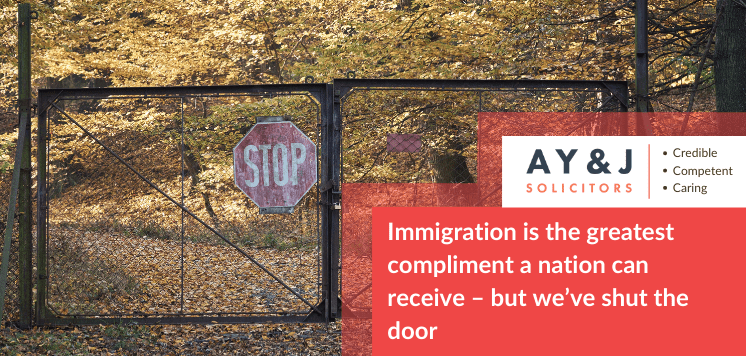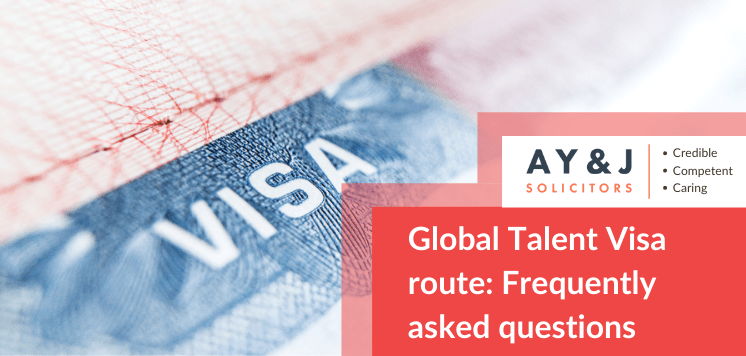Leading UK immigration specialist Yash Dubal gives his verdict on the crisis developing in the shadow of Britain’s final exit from the European Union.
“The final chapter of Britain’s exit from the European Union will play out over the next months, and for many of the millions of people who voted Leave, it will crown the moment that they have been longing for as the nation takes complete control of its borders.
In the run-up to the 2016 referendum, immigration proved time and time again to be the most hotly debated subject and for many voters, the reason they voted to leave. No other aspect of the UK’s membership of the EU was as divisive, inflammatory, or as passionately fought for by those on either side of the debate.
Many on the Leave side felt it was an opportunity to slam shut the doors on the perceived floods of immigrants pouring in to hungrily feast on welfare and drain the NHS. Facts were ignored.
That view is something that always confounded me. I have worked in immigration law for more than 10 years, running a legal firm that has helped thousands of people come to the UK. Without exception, their dream of a new life here had nothing to do with ‘taking’. Instead, they wanted to contribute, they wanted to work hard to better themselves and provide the best life possible for their families. As the Brexit immigration debate raged, I couldn’t recognize the bogeyman immigrant that the Leavers were presenting as a reason for their arguments.
But now, as we prepare to finally ‘take back control’, I wonder if those who voted to leave may soon begin to regret their decision. There are already signals that they may get more than they bargained for.
Brexit has coincided with the most devastating pandemic in generations. The coronavirus outbreak saw a reported quarter of a million EU workers leave the UK to return to their home nations in 2020. At the same time, there was also a dramatic slowdown in EU workers coming to Britain.
To stand alone at this point in history suddenly seems to bring with it very palpable risks.
The world’s economies are hanging in the balance, businesses are severely weakened by the COVID-19 outbreak. And Britain is weaker than many.
Right now, the UK needs to motivate an army of energized workers from all sectors to help rebuild, much as it did following the World Wars when people came from all corners of the globe to assist the recovery. But where will they come from now we have flown the unwelcoming anti-immigrant flag of Brexit?
It puzzles me as to why this xenophobia persists in our society.
I have always seen immigration as the greatest compliment a nation can receive. That people would willingly leave their families and communities to risk a new life in a strange land is a huge undertaking that many of us cannot appreciate.
Today, many of the people literally risking their lives to care for victims of the Covid 19 virus will be migrants, or the children or grandchildren of migrants. They prop up the NHS. And when this health crisis is finally over, hard-working migrants will again help to get the nation’s crippled businesses back on track, be they restaurants, hotels, tech start-ups, care homes or beauty salons. Many of these will be owned and run by migrants and will have migrants working in them. And yet, we haven’t always been welcomed. Some of those post-War migrants faced racism and prejudice. In more recent times, the Brexit vote left many migrants saddened and confused, wondering if the country they call home had turned its back on them.
Growing up in Gujarat, I saw Great Britain as a place of opportunity where fairness where hard work is rewarded. This is the difference that attracts migrants from poorer parts of the world, where opportunities do not exist, because of war, climate change or poverty. In India, one can work hard, but be rewarded with little.
I grew up in a small, remote village and my parents were poor. My father died when I was 17 so my mother started working to support me and my two younger siblings. To me, it was normal, but, with the benefit of hindsight, it was an incredibly hard life. We lived in a one-bedroom apartment. I will always remember the shame of poverty. We wore clothes with holes in them to school. We only had two sets of clothes, one of which was our school uniform. I recall missing out on a school trip once because I did not have the equivalent of 10p to pay for it. Standard school notebooks were 1p, but we could not afford these and used cheaper ones in which the ink leaked through the pages. We could not afford school bags and I used a handmade vegetable carrier instead. Many migrants in the UK will recognise these types of circumstances. This is normal life in many parts of the world.
Until you’ve experienced poverty, it’s hard to understand how much it can influence an individual’s drive to succeed. For as long as I can remember, I was determined to create a better life for myself and my family, no matter what. This mindset is shared by so many migrants from similar backgrounds.
After completing my Computer Engineering degree in India in 2002 I borrowed £1500 from a cousin and arrived in the UK in May 2003 on my own with no contacts and no support. Within 15 days I started working and became self-sustained. I managed to save £50 to send to my mother so she could buy the first fridge she’d ever owned.
I worked seven days a week for 18 hours a day, with no holidays. I worked as a shopkeeper, a cashier and a security guard. In September 2008, at the start of the financial crisis, I started an immigration law firm from a corner of my bedroom in a rented property, with an investment of £30 for two chairs and a table from IKEA. Today I employ a small team, pay taxes and contribute positively to the UK economy. Through my work I know of many other immigrants who have had the same experience. The majority are entrepreneurs who arrive at these shores legally, work hard and build businesses that contribute to the national economy. The pattern is the same all over the Western world. In Germany, for example, according to a recent survey by KFW, a state-owned development bank, one in four of the 605,000 founders of firms in 2019 had foreign origins. They are not limited to shops and restaurants. Spotted, established by Nik Myftari, a refugee from Kosovo, is a dating website. Novum, created in 1988 by Nader Etmenan, who fled Iran, has become one of Germany’s biggest chains of hotels.
It is obvious. Britain needs migrants. And it is sad that they often face hostility, suspicion and lazy stereotyping.
In many ways the UK has much to be proud of. There is still a ‘great’ in Great Britain which is why people will still want to come here. The NHS is still the envy of the world, our welfare system is unrivalled, our education is world class. There is safety and security. It is possible, with hard work, to better yourself and provide a place where your children can thrive.
These are the ‘outsiders’ that we will need to work alongside us to get the country back on its feet post-Covid.
Yet we have already shut the door in their faces, and they may continue to abandon us in their droves.
I am confident that by the end of 2021, there will be many people in this country who will have changed their minds about immigration and who will feel very differently about Brexit.
Sadly, it will be too late.”








